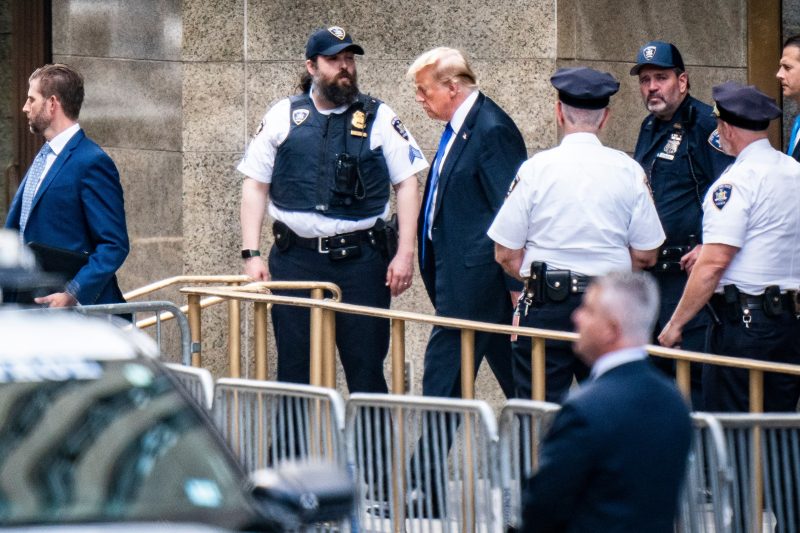Donald Trump had much more success persuading his peers outside his Manhattan courtroom than the 12 jurors within it.
From the moment he was indicted in New York last year — and before it, really — Trump framed the effort as inherently political and, by extension, inherently invalid. Last week, the jurors offered their disagreement: Trump, in their estimation, was criminally responsible for the falsification of business records aimed at covering up a hush money payment to adult-film actress Stormy Daniels. But by the time that verdict was handed down, most Americans had already developed fixed perceptions of what he had done and how important it was.
We can see this in national polling conducted by YouGov for CBS News. The pollsters conducted interviews in mid-May and then reinterviewed many of the same people after the verdict. The change? Not much.
In the first poll, respondents were asked if they thought Trump was guilty. In the more recent one, they were asked if they thought the jury got the guilty verdict right. In the first poll, 56 percent of respondents said they thought Trump was guilty; in the new one, 57 percent said the verdict was correct. Democrats and independents each believed he was guilty and the jury got it right; most Republicans disagreed.
Nearly a fifth of Republicans said the jury got the verdict right, which can be considered in a few ways. One is that about a fifth of Republican primary voters have voted for other candidates, despite — or because of — Trump locking up his party’s nomination. Another is that about a fifth of Trump supporters indicated in March that they already thought he had committed a serious crime. That overlaps with another important consideration: Thinking that the verdict was correct does not mean that Republicans will not support him against Biden. Many Trump voters have long considered him the better of bad options.
Nor should this minority distract from the fact that most Republicans accept Trump’s arguments that the trial was biased against him. Views of the fairness of the trial closely track with views of the verdict, with most Republicans saying they considered it unfair.
Asked why they considered it unfair, nearly every Republican who held that view said it was because the trial was political — the central argument that Trump and his allies have offered.
Most Americans told YouGov that they believed Trump’s crimes were serious, including a quarter of Republicans and a slight majority of independents.
The new CBS poll also asked respondents if they believed that Trump was fit to serve as president in the wake of his conviction. A majority said no, including half of independents.
Again, this is a striking result, outside the context of recent history. In 2016, though, polling repeatedly found skepticism that Trump was fit to serve as president. That didn’t prevent him from being elected president.
It’s admittedly easy, given the recent sweep of electoral history, to assume that nothing will affect Trump’s political position. This poll certainly doesn’t provide many jumping off points for those seeking to argue otherwise. Isn’t it important, one might nonetheless ask, that 10 percent of Republicans think Trump isn’t fit to be president?
Perhaps. And perhaps not. In 2020, 5 percent of Republican voters backed Joe Biden, for example, a reminder that some internal dissent is to be expected. (Four percent of Democrats backed Trump that same year.) Those voters might stay home, lowering the number of votes that Biden needs to win in a state. Or those voters might, as the campaign unfolds, decide that Trump may be more fit than Biden.
(It’s early to read too much into national polling; it takes a while for high-quality polls looking at the election to be conducted and released. But there’s little indication at this point that there’s been a shift post-verdict.)
We should also probably not read too much into the finding that Republicans were overwhelmingly likely to say it was important for Republicans to be loyal to the former president after the verdict. Many Trump allies have made arguments along these lines, that the verdict solidifies support for Trump in a way that will harm the left. But this loyalty to Trump has been central to his support from the earliest days of his political career.
There was one other result in the CBS survey that is particularly worth isolating: the number of Republicans who said the verdict caused them to have less confidence in the criminal justice system. In fact, a plurality of respondents overall said they had less confidence in the system after the verdict (though most respondents said that their confidence in the system was unaffected or increased).
This also reflects attitudes that existed before the verdict: Trump has spent years inculcating a sense of skepticism within his base about law enforcement and the justice system. From the outside, this is obviously self-serving; he has been under investigation for years, and it serves him well for his base to see those investigations as biased.
But just because this is to be expected doesn’t mean it’s not a striking result. Such questions, about the effects of a news story, often simply reflect preexisting views. Meaning that many of those who are saying they feel less confident in the justice system are simply reflecting a distrust that Trump has worked so hard to build in the first place. This, in turn, is a central reason that so many Republicans view the trial as unfair and, again in turn, think the verdict was wrong.
Trump and his lawyers had a month to persuade jurors not to find him guilty, working under the constraints imposed by a criminal trial and the judge. He has had years, though, to influence Republicans, and it has worked very well.

